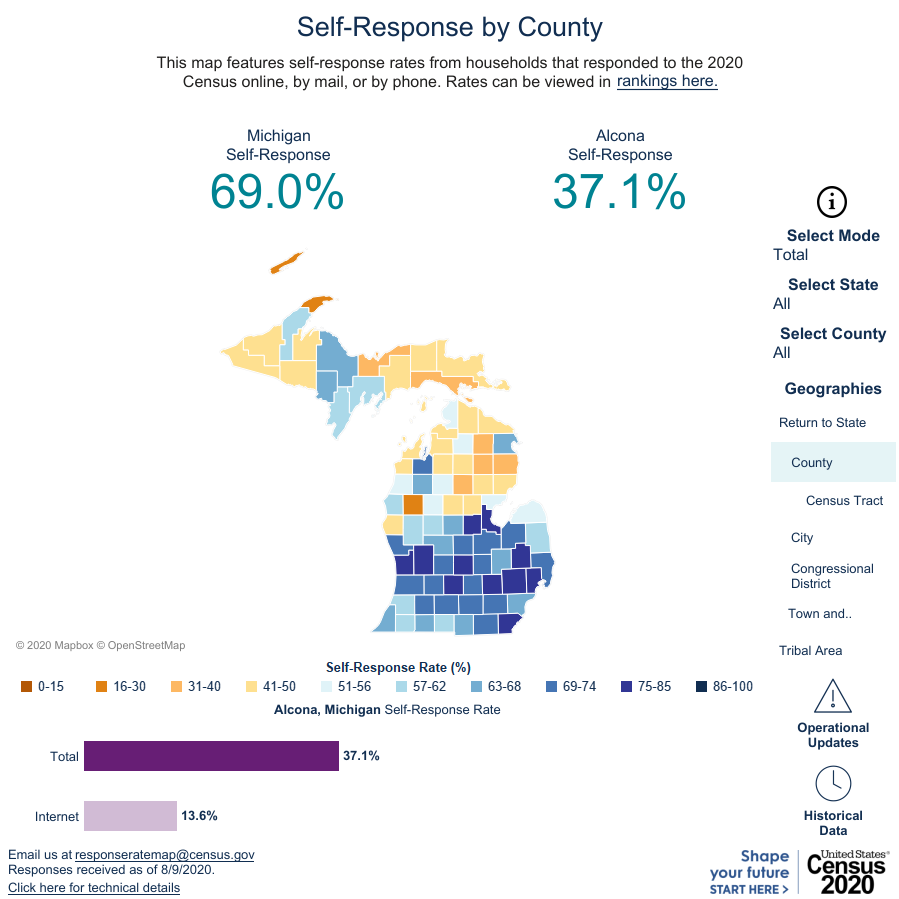Census Takers Race Against Clock As Feds Shave Off Month
The Census now has to be completed by Sept. 30. For Detroit — with a response rate still below 50% — and Michigan, millions of dollars are at stake.

President Donald Trump wants the 2020 U.S census finished by Sept. 30. That’s one month earlier than the Census Bureau had planned to fulfill its constitutional mandate to count every person in the country every 10 years.
“I just fear it isn’t going to be enough time.” — Kerry Ebersole Singh, Michigan’s 2020 census director.
The bureau had delayed the start of its door-to-door campaign because of the coronavirus pandemic. Now, census takers have less than two months to visit every household that has not yet completed their questionnaires and return them.
Critics say that may make it harder to get an accurate count, especially in places where most people don’t typically answer the census.
Michigan has one of the highest self-response rates in the country. But some parts of the state lag behind, partly because they are poorer.
Click on the player above to hear Michigan’s Census Director on the rush to knock on doors.

“Lower-income folks tend to be slower to respond,” says Kerry Ebersole Singh, executive director of Michigan’s 2020 census campaign.
She says many low-income residents in Detroit and northern Michigan either don’t have access to the internet, or can’t afford it. That matters because this year’s census is the first to give most Americans the opportunity to respond online.
So far, almost 70% of all households in Michigan have responded online, by mail, or by phone, surpassing 2010’s final self-response rate.
Ebersole Singh says Detroit and rural northern Michigan communities are also harder to count because they have a higher percentage of people who rent their homes instead of owning them, and they tend to move around more.

Detroit had the lowest response rate among the largest American cities in 2010 — about 63% of all households. As a result, the population dropped almost 25%, from 951,307 in 2000 to 713,777 a decade later. The Census Bureau’s 2019 estimate slipped to 670,031.
As of August 9, less than half (49%) of Detroit’s households had answered the 2020 census, the lowest rate among cities of at least 500,000 people.
Ebersole Singh says the city stands to lose millions of dollars in federal funds that are based on census data. That includes money for Medicare, nutrition programs, roads and bridges.
“This is something that impacts us for ten years,” she says. “In Detroit, they estimate around $5,500 per person is at stake on an annual basis.”
By contrast, Detroit’s suburbs have not been shy about participating in the 2020 census. Nearly 80% of all households in Macomb County have responded so far, the highest rate among U.S. counties with at least 500-thousand people. Oakland County’s rate is 77%. And Huntington Woods has the fifth-highest rate (93%) among all cities in the nation.
Ebersole Singh says census workers are doing the best they can to complete the count by the president’s Sept. 30 deadline.
“Normally, the get to do six passes at an address to get folks living in that household to respond,” she says. “I just fear it’s not going to be enough time.”
Trusted, accurate, up-to-date
WDET is here to keep you informed on essential information, news and resources related to COVID-19.
This is a stressful, insecure time for many. So it’s more important than ever for you, our listeners and readers, who are able to donate to keep supporting WDET’s mission. Please make a gift today.
